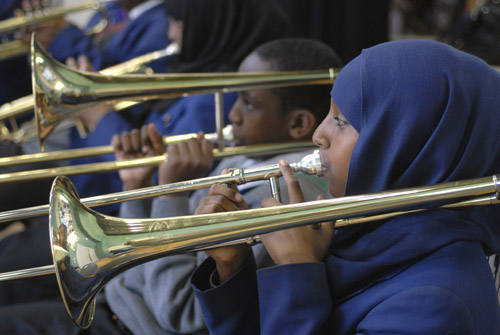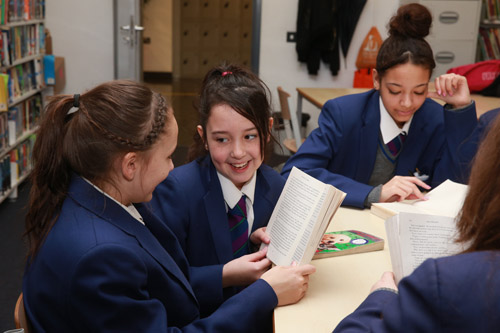We have high expectations for all our pupils and ensure that every learner is challenged and supported to reach their full potential.
The English Curriculum
The English Department at Platanos College is both large and successful, with many experienced and more newly qualified teachers. English is a multi-disciplinary subject encompassing the study of language, drama, speaking and listening, writing, reading, media and ICT work.
Members of the English department successfully teach a wide range of skills in line with the National Curriculum, whilst offering a stimulating framework which captures the enthusiasm and enjoyment of English for students of all abilities. Our key goal is to empower pupils to understand how language and literature give insight into how the world words, how we make sense of it through language and how we understand others’ views and construct our own identity. Through this, we can support all students in achieving their potential both academically and personally.
The English department embed key GCSE skills within lessons from year 7 to enable pupils to master these skills as they move towards year 11. These skills include:
- Language analysis
- Structural analysis
- Word level identification and analysis
- Evaluation skills (To what extent does the author/poet/playwright…)
- Comparative analysis
- Spelling, punctuation and grammar
- Structuring writing effectively
- Synthesising of information
- Embedding of information to form successful responses to texts
- The interrelationship between text and context
The English department at Platanos believe strongly in the importance of literacy, reading both for enjoyment and to aid academic success. Therefore, all Year 7, 8 and 9 pupils have a timetabled Accelerated Reader lesson in the library once a week, this session is delivered by our librarian and supported by their English teacher. Pupils read to the staff, take quizzes to demonstrate their knowledge and understanding of the books they have read and discuss views and opinions with their peers. Staff guide pupils to become independent in expressing their ideas and choosing what they read and write. Independent reading is encouraged at all Key Stages and forms part of English lessons for Key Stage 3 pupils.
We are committed to offering pupils a variety of extra-curricular activities and consider this a key strength of the department. We have a flourishing Creative Writing Club and a successful Debating Society, ‘Debate Mate’, within which pupils have the opportunity to debate against other schools in London in a variety of competitions. Recently, our pupils have been to the Globe Theatre to see performances of Romeo and Juliet and The Taming of the Shrew. We have teamed up with the History department to take pupils to the London Dungeons and on a Jack the Ripper walking tour to help them with their understanding of the context of the Victorian texts they study. Furthermore, we have taken pupils to performances of An Inspector Calls, The Tempest, The Life of Galileo, A Midsummer Night’s Dream and many more. We feel that these events and clubs are integral in instilling a love of English within our pupils not solely through their academic studies.
Key Stage 3 English
The Key Stage 3 curriculum is studied over Years 7 and 8, therefore pupils begin their GCSE journey in Year 9. We offer a broad, balanced and engaging curriculum where pupils are encouraged to become independent learners. Pupils are also encouraged to broaden their academic knowledge through extended, creative, project work. We are proud of our outstanding GCSE results and recognise the importance of embedding the necessary skills at Key Stage 3 to ensure pupils excel in their exams at Key Stage 4.
Pupils explore a wide variety of texts including; Gothic literature ‘A Christmas Carol by Charles Dickens, poetry that encompasses a variety of themes and genres, the Shakespearean play ‘Much Ado about Nothing’ and the Victorian novel ‘A Speckled Band’ by Arthur Conan Doyle. In addition, Year 7 pupils will be introduced to the skills needed for both Language examinations at GCSE. These skills are embedded within the lessons and they include; writing to persuade, to inform, to advise and argue.
Pupils analyse Victorian literature, Dickens’ Oliver Twist, a selection of war poetry, non-fiction texts such as Of Mice and Men by John Steinbeck and ‘Romeo and Juliet’ by William Shakespeare. Pupils are also introduced to more complex skills within lessons such as effectively evaluating a writer’s purpose. These skills link directly to the criteria for both the Literature and Language examinations at GCSE. The skill of writing comparatively is a key criterion within the curriculum in year 8 as this is a significant factor that pupils must utilise effectively in preparation for their GCSE examinations.
In Year 9, pupils continue to learn and embed skills learnt in Key Stage 3 and begin to explore elements of the GCSE courses:
- Analyse the prose text ‘Jekyll and Hyde’, where they are assessed for their understanding of the social, cultural and historical context of the novel and their ability to analyse the language and structure of the text as well as Stevenson’s methods and intentions.
- Explore unseen poetry from a range of cultures and traditions.
- Respond to the Shakespearean text ‘Macbeth ’. In year 9 students will be introduced to the plot, themes and characters of the play.
- Explore how to use a range of stylistic conventions to write for specific audiences and purposes with a clear focus on the Language papers.
Key Stage 4 English
Pupils continue their path from Year 9 into Year 10 and ultimately into Year 11 where they have the potential of attaining a double award for English Language and English Literature from the AQA (Language) and Edexcel (Literature) awarding bodies.
In Year 10, pupils are able to develop their knowledge, skills and understanding of language and its usage by responding to English in the daily world through the study of a range of onscreen and or paper texts. They are also able to develop their awareness of how spoken language works in preparation for the Spoken Language component of the English Language GCSE Examination.
- Relationship poetry from the AQA Anthology ‘Love and Relationships’ is studied and analysed in depth. Each poem studied is dissected in terms of how it can be compared and contrasted with the other poems within the anthology.
- An Inspector Calls by J.B. Priestley is initially studied in Year 10. The study of the play takes place along with Language style questions with a character or theme from the play underpinning the question itself.
- Macbeth is explored in more detail in Year 10 with context and critical analysis of the play forming a large proportion of the syllabus.
- Transactional writing is studied in Year 10. This piece makes up 50% of marks for Language Paper 2.
In the summer term, Year 10 pupils sit a Mock GCSE English Examination in preparation for the following year. It is essential that pupils understand examinations and procedures in order for them to be well versed when they undertake the actual examinations in year 11. We believe that in preparing pupils we can ensure that they are as equipped as possible to achieve the very best possible result in Year 11.
AQA English Language (Language Paper 1 Fiction / Language Paper 2 Non- Fiction)
In Year 11, pupils will have studied all aspects of the GCSE course. Year 11 offers a year in which pupils will expand on and improve the learning they have already undertaken in year 9 and 10. The pupils undertake their examinations in May. They will sit two language papers and two literature papers.
- Paper 1: Explorations in Creative Reading and Writing – pupils are asked to read an unseen 20th century extract and respond to questions on language, structure and evaluation.
- Section B: pupils will be asked to write a descriptive or narrative essay. They will be given a picture/photograph or a written stimulus as a prompt. Pupils must use spelling, punctuation and grammar correctly in their written piece.
- Paper 2: Writer’s Viewpoints and Perspectives– pupils must read an unseen 19th century and 21st century extract, summarise, analyse the language used and compare how writer’s methods are effective.
- Section B: pupils will be asked to write a letter/speech/article/leaflet to a specific audience to either advise/persuade/argue or inform. Pupils must use spelling, punctuation and grammar correctly in their written piece.
For more information on this exam, visit (external site):
http://www.aqa.org.uk/subjects/english/gcse/english-language-8700
Edexcel English Literature (Literature Paper 1: Shakespeare and Post 1914 Literature/ Literature Paper 2: 19th-century Novel and Poetry since 1789)
- Paper 1:Pupils answer an extract question on Macbeth and an additional question which is usually on a theme or character where they relate their response to the text as a whole. Pupils utilise their skills in language and structural analysis as well as relating the text to its context. Pupils answer one question out of a choice of two on the play ‘An Inspector Calls’.
- Paper 2: Pupils answer an extract question on Macbeth and an additional question which is usually on a theme or character where they relate their response to the novella as a whole. Pupils utilise their skills in language and structural analysis as well as relating the text to its context. Pupils respond to a comparative question on poetry from their studied anthology and additional unseen poetry questions.
For more information on this exam, visit (external site):
https://qualifications.pearson.com/en/qualifications/edexcel-gcses/english-literature-2015.html




